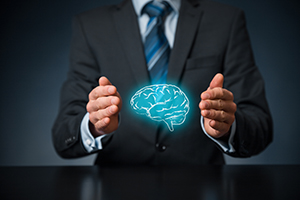 When thinking of healing ED, doctors are – for obvious reasons – most often focused on the genital area.
When thinking of healing ED, doctors are – for obvious reasons – most often focused on the genital area.
Those that are a little bit more advanced may pay attention to your cardiovascular system and overall blood flow.
But a new study focuses on an organ that at first glance has nothing to do with ED. And tackling it in the right way may be the easiest way to cure it naturally.
Psychogenic erectile dysfunction refers to the type of ED that prevents you from having or maintaining erection good enough for penetrative sex that is primarily or completely caused by psychological, social, or personal factors, rather than strictly biological ones.
In the latest edition of the journal Brain imaging and behavior, Chinese researchers have now shown that the brain, which is often just a physical organ, may be more involved in this type of ED than usually assumed.
In most previous studies, scientists were interested in brain activity while men were watching or otherwise engaging with sexual stimuli.
But these researchers wondered whether the brains of men with psychogenic ED functioned differently from those of men without ED, even while not aroused.
If we want to know how the brain works, we do an FMRI (or Functional magnetic resonance imaging).
An FMRI scan can tell us exactly which part of the brain is in use, because blood flow increases to the areas of your brain that you are currently using.
The Chinese researchers recruited 52 subjects, 26 with ED and 26 without it, and then performed the brain scans.
They found that the right anterior insula and right orbitofrontal cortex were a lot less active in people with ED than in those without no sexual dysfunction. Remember that this was the case while they were engaging in no sex-related activities at all.
Your right anterior insula is the part of your brain that is responsible for your awareness of your own body, like you use when you count your own heartbeats or breaths.
It also helps you to pay attention to and remain focused on something in your environment, like you do while reading.
Interestingly, if you are a drug addict (which you hopefully are not), it is one of the parts of your brain that becomes the most active when you see something that triggers your drug cravings.
The right orbitofrontal cortex is one of the most poorly understood parts of your brain, but it is thought to be involved in advanced thinking, decision-making, and impulse control; the type of activities that are supposed to distinguish humans from animals.
More relevant to this study, it is responsible for modifying and controlling the ways your body responds to emotions, such as when you tremble or get a fluttery feeling in your stomach in response to anxiety.
As a result of their findings, the scientists concluded that the brains of some men with ED showed an impairment in the cognitive, motivational, and emotional processing of environmental and bodily stimuli.
You can see how that can ruin your ability to have successful sex.
If you see something that is supposed to cause arousal, you may not be able to pay attention to it (inactive right anterior insula), you may not feel your body’s responses to it (inactive right anterior insula), and your body, and sexual organs specifically, may not be able to respond to the emotions you feel (inactive right orbitofrontal cortex).
It is likely that these lazy parts of your brain may become active again once you address the psychological, social, and personal problems that interfere with your sex life.

 Overcoming IBD
Overcoming IBD Multiple Sclerosis
Multiple Sclerosis Banishing Bronchitis
Banishing Bronchitis Gum Disease Gone
Gum Disease Gone Overcoming Onychomycosis
Overcoming Onychomycosis Neuropathy No More
Neuropathy No More The Prostate Protocol
The Prostate Protocol Brain Booster
Brain Booster
 Ironbound
Ironbound
 Solution for Shingles
Solution for Shingles
 The Bone Density Solution
The Bone Density Solution
 The Ultimate Healing Protocol
The Ultimate Healing Protocol
 The Parkinson's Protocol
The Parkinson's Protocol
 The Chronic Kidney Disease Solution
The Chronic Kidney Disease Solution
 Overthrowing Anxiety
Overthrowing Anxiety The Fatty Liver Solution
The Fatty Liver Solution The Hypothyroidism Solution
The Hypothyroidism Solution
 The End of Gout
The End of Gout The Blood Pressure Program
The Blood Pressure Program
 The Oxigized Cholesterol Strategy
The Oxigized Cholesterol Strategy
 Stop Snoring And Sleep Apnea Program
Stop Snoring And Sleep Apnea Program
 The Arthritis Strategy
The Arthritis Strategy The Vertigo & Dizziness Program
The Vertigo & Dizziness Program The 3-Step Diabetes Strategy
The 3-Step Diabetes Strategy Hemorrhoids Healing Protocol
Hemorrhoids Healing Protocol The Erectile Dysfunction Master
The Erectile Dysfunction Master Weight Loss Breeze
Weight Loss Breeze The IBS Program
The IBS Program The Insomnia Program
The Insomnia Program The Migraine and Headache Program
The Migraine and Headache Program The Neck Pain Solution
The Neck Pain Solution The Menopause Solution
The Menopause Solution The Ejaculation Master
The Ejaculation Master The TMJ Solution
The TMJ Solution The Acid Reflux Solution
The Acid Reflux Solution The Fibromyalgia Solution
The Fibromyalgia Solution The Psoriasis Strategy
The Psoriasis Strategy